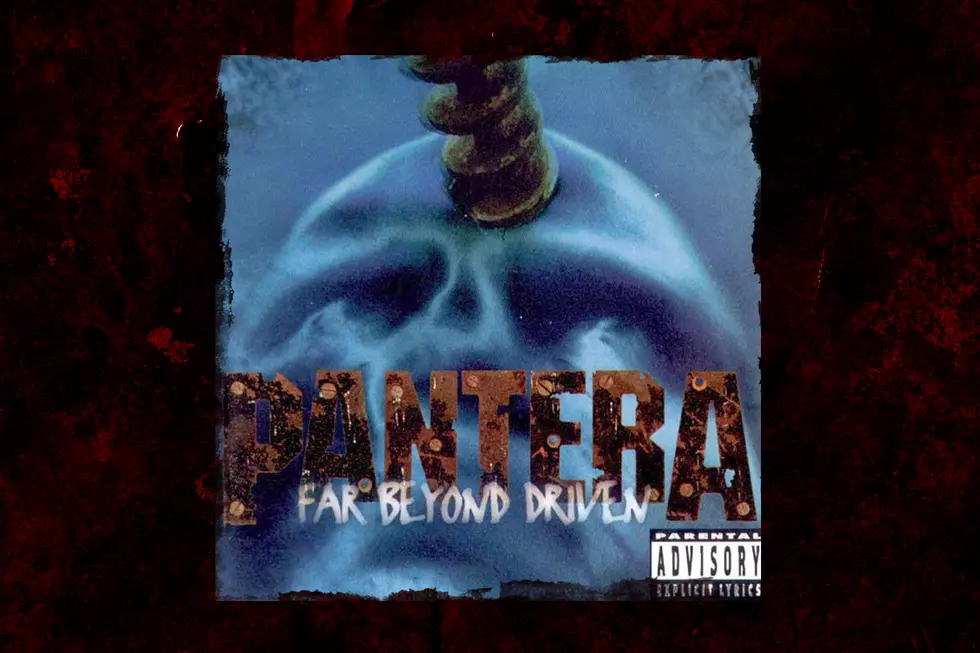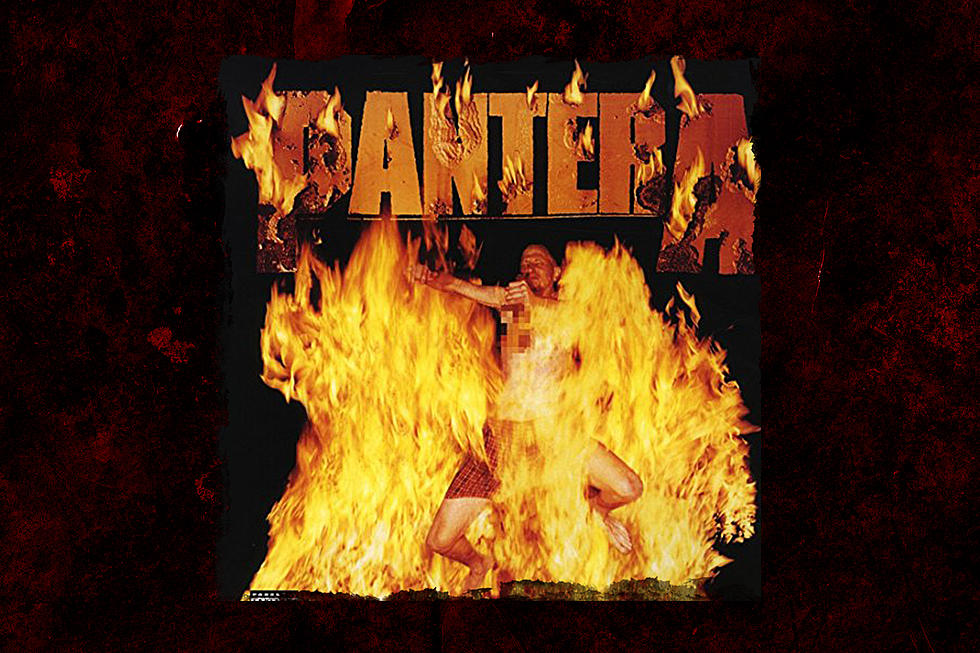
Rex Brown Goes In-Depth About His New Book and the Legacy of Pantera
As the longtime bassist for Pantera, Rex Brown toured the world many times around as a member of the band that would dominate and redefine the genre of heavy metal during the late ‘80s and ‘90s.
Their reign continued into the current century, culminating with the release of Pantera's ninth studio album, 2000's ‘Reinventing the Steel’ (which was their sixth album in the band’s most popular era of recording with vocalist Philip Anselmo at the helm). About a year and a half later, Pantera would play their final show as a unit, splitting at that point to pursue individual side projects.
The tragic 2004 shooting death of guitarist Dimebag Darrell would bring an unfortunate end to the likely and logical future possibilities for Pantera. As for what might still be ahead for the remaining members, Brown will only say “never say never” when asked about the prospects of further activity with his former Pantera bandmates.
Brown is telling his side of the Pantera for the first time with ‘Official Truth, 101 Proof: The Inside Story of Pantera’ and as the title indicates, it’s an unflinchingly honest look at the group, from their earliest beginnings to the ending moments and the things which have happened since then.
We recently spoke with Brown to get some thoughts about the book itself, his time with Pantera and the latest activities with his present band Kill Devil Hill.
Your book is really the first official statement on Pantera and the legacy of the group from a band member. It seems possible that it could be a bit daunting to be the first one in to tackle this project. Was that the case on your side of things?
Yeah, probably towards the end [when I was] going through final edits and taking stuff and pulling it apart and trying to figure out names. If it was up to me, it would have been 1,000 pages long. Because how can you put a 20-odd year relationship with a band into 300 pages? It’s kind of hard. We did the best that we could with it and this might be the start of something that keeps coming out. You never know. I’m not saying that’s going to happen, but I’ve got tons more stuff.
Fans always dug the home videos that Pantera put out because they gave them a behind the scenes feeling and this book really does that as well. I don’t think anybody would expect something candy-coated from you, but this book is certainly not that -- it’s unvarnished in its presentation.
I just wanted to tell my side of the story. You know, I never was in the press -- it’s not that I wasn’t in the press, but I did the smaller publications, where Vinnie [Paul] would tackle some of the other stuff, just because I didn’t feel like doing it or was too hungover or whatever. You know, you’ve got to remember that we played 250 dates a year, so it was pretty eventful. It was just something that came up. A guy [author Mark Eglinton, who is the co-author of the new book] came to me and I did an interview for one other book of his and he goes, “Well, how would you like to put your memoirs down?”
And of course at first, I said, “Well dude, I’m not dead yet.” You know, music people put their biographies out when they’re f---ing 77 and by that time, you can’t remember hardly anything by then anyway. So I thought, “Well, s--t, let’s go ahead ... let’s start talking about how we want to do this first.” So we kind of made some ground rules in how we wanted to do it and I’m happy with it man, I really am. You know, it’s kind of hard looking inside the bubble, because I’m so close to it. But from everybody I’ve talked to, they really enjoy it, so that makes me happy.
The book has a bit of an oral history feel to it at times, because you’ve involved other voices in the telling of the stories besides just your own. Was that the intention from the beginning when you began writing this book?
That came in about the middle. It was [co-author] Mark [Eglinton’s] idea. He goes, “Why don’t we get some people that know about this period of time and just interview them.” I’ll tell you exactly what it was. I had just finished reading ‘Life’ by Keith Richards. I don’t know if you read the book, but it’s awesome. So, basically I ripped everything off from Keith’s diagram and there you have it. [Laughs]
You’ve been more of a private person in the past, compared to the rest of the members of the band. How did you work past that piece of it to get into a mode where you were comfortable enough to write this book?
I think [that came] just with maturity and before I f--king forget everything that went down. Things happen for reasons and sometimes we don’t know why. This was the time and I thought, “Well, if this is going to be the time, we’d better kick f---ing ass at it.” I don’t like putting half-ass s--t together.
As far as private life, at the time it was just one big mess that was going on and I didn’t want to really talk about any of that mess to the press, because it was our own mess that we made. That being said, I just felt that [back then] it was time for me to not say anything. So I guess now is the time for me to say something. You know, I make fun of the “old” part, but that’s just making fun. I wanted to be really honest with this one and that’s what we did with it.
The first four 'pre-fame' albums get a good amount of coverage in the early part of the book. There was a perception that the band really didn’t like to discuss that period of work when doing interviews. It’s interesting reading, because it does flesh out the important role that those albums played in the development of the band.
Well, we had changed ... Jesus Christ, I was f---ing 16 or 17 when we did that first record. So we were just kids growing up. So when we had matured to a certain level and played every nightclub in the Southwest six nights a week, three sets a night, you really start getting your s--t together. So those records were just starting points for the band, you know? Even though I can listen back to them and I like them -- we were just in a different direction than what we were doing before, that’s the reason that we kind of kept it in the dark.
Because of all of the naysayers, you know, “Oh, they’re a f---ing bunch of posers back then. Their hair’s all glammed up....” Whatever. That just what you had to do to [get gigs] and play in a f---ing bar [in that time period].
These owners that were running the scene, if you didn’t look like [that], you couldn’t get a f---ing dollar if you wanted to get up and play. You’d actually have to pay to play if you looked like a f---ing vagrant. It’s just one of those things that you live and you learn, just like anything else in life.
On the one side of things, you had a chance to really polish and develop the machine before the band hit the major label level, but on the other side of things, moving 25,000 copies of the ‘I Am The Night’ album, that’s nothing shabby for an indie band, especially for the time period.
Oh, that’s great and you know, we got turned down by 28 different labels, trying to get our foot in the door. They’d go, “Oh yeah, we’re into it, we’ll be down and check you out.” Or we’d go showcase in New York City, L.A. or whatever and we lost a singer [Terry Glaze] in the process and got Phil [Anselmo]. Thank God.
Once [Anselmo] got in the band, it seemed to move so quickly that it seemed like those other three years that had gone by before were eight years long. When Phil got into the band, it just went by really, really quick, because everything just gelled. He was exactly what we needed.
Pantera opened up a whole new chapter for heavy metal. What are your feelings about that as you look back both personally and with this book?
You know, playing with Kill Devil Hill now, it’s come full circle now for me. The hunger that we had back in the day with Pantera, has come back for me. Maybe that was some of the reason that I wanted to do this book, also. The bond and the union that it takes for a band to be a band and go through the challenges and everything. And it took me a while, after I had the surgery and everything else, it gave me time to really reflect.
Being out there with Kill Devil Hill, do you see the influence that you’ve had on other bands?
I see a lot of bands and I’m flattered. I’m not going to mention any names, but there’s a lot of bands that are trying to be what Pantera was. And like I said, I find it very flattering, but at the same time, there’s only one and that was us. Yeah, it’s cool, but I miss those days a lot, so I thought it was also time to speak out too [with the book].
You write about how Metallica’s move towards a more commercial sound with the Black Album really opened up a hole for Pantera. After hearing that album, how much did that adjust the feel of the material that you were working on for ‘Vulgar Display of Power’?
I think it was probably subconscious in a way of knowing that, “Okay let’s write the best s--t we ever could.” With ‘Vulgar,’ when we were doing that record, everything was so magical with every riff that came through and everything that we were doing, that we didn’t really consciously think, “Well, we’ve gotta f---ing beat Metallica” or “Yhey’ve gone soft” -- we had just done our homework, so it was just a natural progression for us, really.
That being said, we got the Skid Row tour and Phil had two ways of looking at it and I said, “Look, we need to take these f---ing fans with us or you can just say f--k off every night and we won’t get one fan out of it.” We could be doing underground s--t the rest of our f---ing lives and why do that? That’s not what Pantera was all about. We wanted to be heavy but at the same time, the masses came to us, which was a great feeling.
Some of these people would literally have their f---ing jaws on the floor after they heard ‘Vulgar,’ so if that’s any indication of where we were heading, then we knew where our place was. So [if it was] anything with the Metallica comparison, I think it was just totally Phil spouting his mouth off, which was amusing at first, during shows and then it became a little [bit like], “Oh come on, dude, come up with something else.” But that was then and this is now. We’re different people, but we’ve just matured.
We pretty much have the same drive in everything that we do. I know that I can only speak for myself that I do. I know that Phil still has that drive and he’s a lifer. Vinnie [Paul], I don’t speak with, but I’ve heard his latest offerings and.... [Brown pauses for several seconds], that’s all I’m going to say on that.
Pantera played shows all over the world, including Russia. What was the experience like for you?
Oh dude. F---ing frightening and at the same time, exhilarating. You name an emotion, it’s probably there. Sickening. [Laughs] That many people, you know and you’re [the] first to go out, playing with that kind of talent. We kicked some ass that day. That’s all I can say. You’re only as good as your last gig and that was definitely a high point for me personally, being able to do something like that in the first place.
Can you talk about touring with Black Sabbath?
Oh, that was awesome, man. It was great. It’s better than sitting at home, doing nothing.
Did you get much of a chance to interact with the guys like Geezer Butler and Tony Iommi on that tour, to talk technique and some things like that?
Every once in a while, you do, but not often. It’s more about current events and stuff like that. We’re all peers and we all have different styles and ways that we things, but it was always nice to talk shop every once in a while. But it was very much every once in a while.
I can guess that you will probably send a copy of this book to Phil. Will you reach out and send a copy to Vinnie, as well?
[Vinnie] can do whatever he wants. Yeah, I definitely will send a copy out to Phil as soon as I get home. I’ll sign it and here it is buddy. We’re still friends. Everybody wants to put animosity in this f---in’ s--t. The only animosity we have is the hatred that Vinnie has on his back. Hell, they’re advertising it on the f---ing Down page, that’s pretty nice of them.
If there’s an opportunity for some sort of musical closure with Vinnie and Phil, do you still look for that at all?
You know, I never say never. Never say never. You don’t know what tomorrow brings, all you can do is live in today. I’m doing the best I can today.
Do you hope for that though? Is that something that you think about?
Nope, we’ve all gotta put our feet in front of each other and get on down the road called life. No, I don’t sit around waiting for a call.
When you look back at everything, what was it that made Pantera work so well?
Really good songs. The chemistry between all of us and the bond that we had and being unique and sharing all of the common goals, that’s what made it what it was. Four different individuals putting everything together and you know, the hills and valleys that you have to get up and down and go over. I’m very proud of the f---ing legacy that we’ve made and left.
You've got new music in the works for your band Kill Devil Hill ...
We’ve got nine tracks in the can and we’ve got about five more that we want to record. We’re using Jeff Pilson -- he’s going to co-produce the thing with us. This guy’s an extremely good engineer and he brings a lot of stuff to the table that maybe we might not have focused on when we were going through the songs and he’ll throw in [his] two cents here and there [and] that’s really kind of helped make these songs a lot better than they might have become.
It’s more of a collective unit now and more collaborative between all of us, on this second record. If you liked the first one, you’re going to be floored with this one. It’s still heavy as piss and [vocalist] Dewey [Bragg] has really come out of his skin on this and the kid’s a f---ing star, man ... We're hoping to have [a new album] out at the end of August.
Will there be tour dates this summer in support of the new album?
I think as soon as we get everything down in the studio, there will be a big announcement. I know people always say that, but you’ll be seeing some stuff happening.
Our thanks to Rex Brown for taking his time to chat with us. His new book ‘Official Truth, 101 Proof: The Inside Story of Pantera’ is currently available at Amazon.com and book stores everywhere.
More From Loudwire









